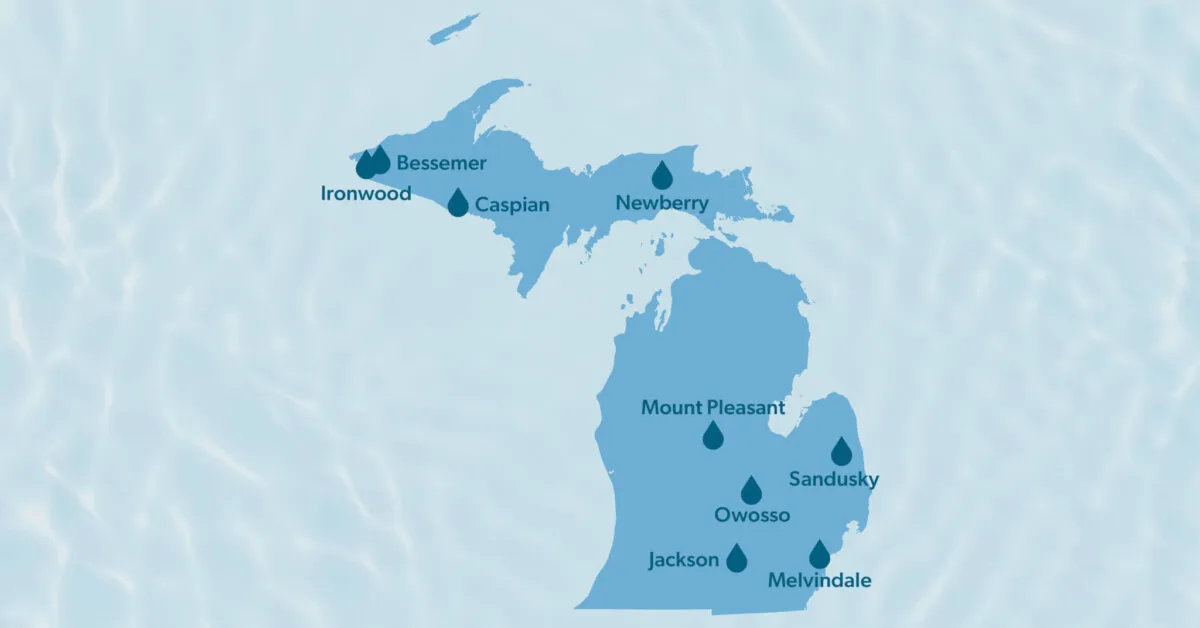
More than $45 million in grant funding from the Michigan Department of Environment, Great Lakes and Energy is set to help nine communities upgrade their local water infrastructure.
MICHIGAN—Millions of dollars in state grant funding announced this month is set to help upgrade aging water infrastructure across several Michigan communities, which will ensure local residents have access to clean drinking water as well as protect the local environment.
The state Department of Environment, Great Lakes, and Energy (EGLE) on Friday announced $45 million in MI Clean Water grants to help with nine different water projects across Michigan.
Among them: Significant wastewater system upgrades across the Upper Peninsula; lead service line replacements in Melvindale; and improvements to Mt. Pleasant’s wastewater plant.
State officials estimate that 70% of Michiganders are served by one of the more than 1,000 community wastewater systems in the state, and that a similar percentage get drinking water from local water systems. Because those systems often struggle to find resources to fix aging equipment, Gov. Gretchen Whitmer and the state Legislature have repeatedly boosted funding to help get the job done.
More than half of EGLE’s budget is usually passed on directly to local cities, towns, and other government agencies to help finance various infrastructure improvements, including for clean water. The latest state budget includes nearly $600 million for water infrastructure —including efforts to replace lead service lines, rebuild sewer systems, and protect access to drinking water. Another $20 million will clean up polluted sites in disadvantaged communities statewide.
Here’s a quick look at the grants that were awarded this week:
Gogebic-Iron Wastewater Authority — $20 million
This project involves several major improvements to the Gogebic-Iron Wastewater Authority wastewater treatment plant, which serves the cities of Ironwood and Hurley, Wisconsin. Among them: Upgraded electrical and filtering systems, new sludge handling equipment, and more.
City of Mount Pleasant — $9 million
This grant will allow the second phase of improvements to the city’s Water Resource Recovery Facility—including the demolition, repair, and replacement of various treatment equipment.
City of Melvindale — $4.4 million
This project involves replacing about 9,400 feet of water main and 56 lead service lines, as well as installing 2,500 feet of water main along Dix and Greenfield roads and Dora and Wall streets.
West Iron County Sewer Authority — $3.2 million
This project includes upgrading an ultraviolet disinfection system, replacing equipment, and upgrading control systems at the Sewer Authority’s wastewater treatment plant in Caspian, which handles waste from Caspian, Iron River, Gaastra, and parts of Iron River Township.
City of Sandusky — $2.5 million
The project involves replacing 1.25 miles of water main beneath M-46, which includes replacing city-owned water lines and about 18 lead service lines that run along the replacement route.
Section 32 Sewer Authority — $2 million
This grant will enable the aging lagoon treatment systems in Wakefield Township to be properly cleaned up and abandoned, and also create a system for waste to be redirected to a lagoon at the Black River Basin Ski Hill, which is operated by the Bessemer Area Sewer Authority.
Bessemer Area Sewer Authority — $2 million
This project involves closing down and abandoning the septic systems at the Black River Basin Ski Hill near Jackson Creek in Bessemer Township, and instead allowing wastewater there to be redirected to the Bessemer Area Sewer Authority’s wastewater treatment plant for full treatment.
City of Owosso — $1.4 million
This project involves various replacements, improvements, and upgrades to the city’s wastewater treatment plant—including new waste filtering and disinfecting systems.
Village of Newberry — $512,000
The project involves fixing about 10,000 feet of sewer pipes throughout the village, as well as allowing the city to buy a 40-acre property where it can dump its sludge instead of a landfill.
For the latest Michigan news, follow The ‘Gander on Twitter.
Follow Political Correspondent Kyle Kaminski here.
Support Our Cause
Thank you for taking the time to read our work. Before you go, we hope you'll consider supporting our values-driven journalism, which has always strived to make clear what's really at stake for Michiganders and our future.
Since day one, our goal here at The 'Gander has always been to empower people across the state with fact-based news and information. We believe that when people are armed with knowledge about what's happening in their local, state, and federal governments—including who is working on their behalf and who is actively trying to block efforts aimed at improving the daily lives of Michigan families—they will be inspired to become civically engaged.


VIDEO: Trump isn’t the only republican facing charges for alleged financial crimes
https://www.tiktok.com/@gandernewsroom/video/7361494909938978090 A whole lot of Michigan Republicans and lobbyists are facing criminal charges for...

VIDEO: It’s expensive to be poor in Michigan
https://www.tiktok.com/@gandernewsroom/video/7361154790300060974 Ever heard of predatory payday loans? Here’s how new laws could help protect...

Here’s everything you need to know about this month’s Mercury retrograde
Does everything in your life feel a little more chaotic than usual? Or do you feel like misunderstandings are cropping up more frequently than they...

The ’Gander wins multiple 2023 Michigan Press Association awards
MICHIGAN—The ’Gander Newsroom has earned multiple awards in the 2023 Michigan Press Association Better Newspaper Contest. The awards were announced...

Michigan Republicans ask Supreme Court to restrict medication abortion access
A lawsuit supported by Republicans could disrupt access to the most common form of abortion—even in Michigan, where reproductive rights are...





